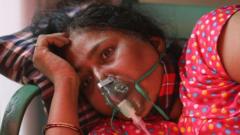In a controversial move, US Health Secretary RFK Jr. has canceled significant funding for mRNA vaccine projects, prompting concerns among experts regarding the implications for future vaccine development and public health strategies.
RFK Jr's Decision to Cut mRNA Vaccine Funding Sparks Controversy and Concern

RFK Jr's Decision to Cut mRNA Vaccine Funding Sparks Controversy and Concern
Health experts debate the implications of pulling $500 million in funding for mRNA vaccine research as Robert F. Kennedy Jr. champions alternative vaccine platforms.
US Health Secretary Robert F. Kennedy Jr. has ignited a firestorm of debate by canceling 22 mRNA vaccine projects, valued at $500 million, which were aimed at combating infections like COVID-19 and influenza. Known as a prominent vaccine critic, Kennedy asserts that a review of scientific data led him to believe mRNA vaccines lack efficacy in protecting against upper respiratory infections. Instead, he proposes a shift towards "safer, broader vaccine platforms" that can adapt to viral mutations more efficiently.
This decision raises pivotal questions about the safety and efficacy of mRNA vaccines, which were initially celebrated as revolutionary during the COVID pandemic. Professor Adam Finn from the University of Bristol deems the rejection of mRNA technology as a potential "catastrophic error", emphasizing that while there may be merit in examining alternative approaches, completely dismissing mRNA vaccines would be short-sighted.
Kennedy's claims suggest that mRNA vaccines do not provide adequate protection against viruses like COVID-19 and the flu; however, experts including Professor Andrew Pollard from the Oxford Vaccine Group challenge this notion, pointing to clinical trials and post-authorization monitoring that indicate substantial protective benefits from these vaccines, especially during critical periods of the pandemic.
Despite the undeniably positive impact of mRNA vaccines in saving lives, they are not without drawbacks. The vaccines focus on a single viral protein; thus, mutations in the virus can diminish their protective capabilities over time. Critics argue that exploring other vaccine technologies—such as inactivated or attenuated vaccines—could yield a more robust solution against diseases with high mutation rates.
Specialists assert that mRNA technology is particularly advantageous in rapid vaccine development. In the event of an outbreak, mRNA vaccines can be created in a matter of weeks—far more efficient compared to traditional vaccine development, which often spans months. Concerns have arisen that a withdrawal from mRNA research could hinder preparedness for potential pandemics, especially regarding emerging threats like avian influenza.
Beyond immediate funding impacts, this decision may influence public perception of vaccine reliability and effectiveness, particularly in a landscape where the US plays a leading role in global medical research development. Experts question the long-term ramifications not only on infectious disease management but also on promising applications of mRNA technology in cancer treatments and rare genetic disorders.
The scientific community remains unsettled about Kennedy's stance, emphasizing that the consequences of abandoning mRNA research could jeopardize public health advancements, raising alarms about the future of medical innovation in vaccine technology.





















